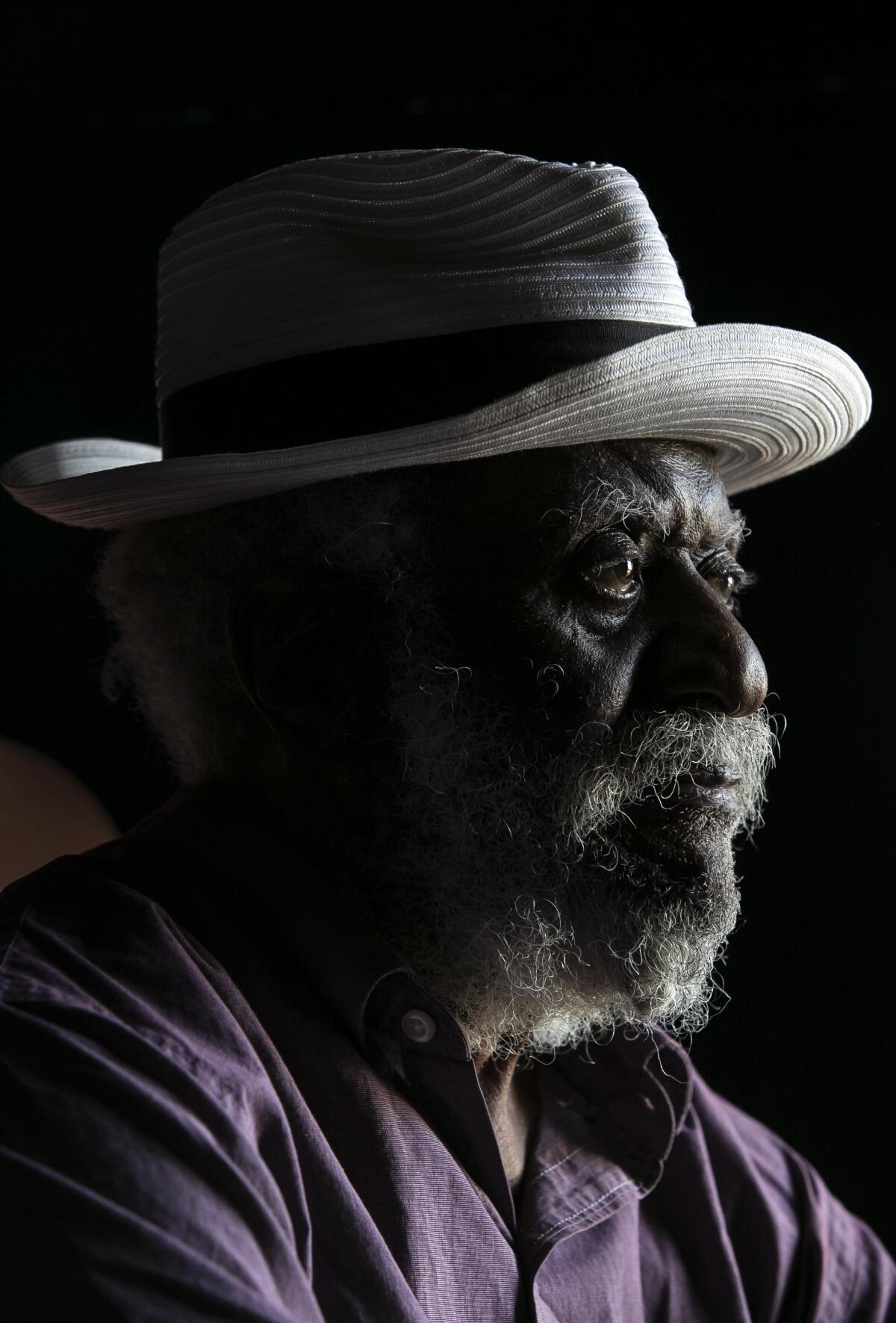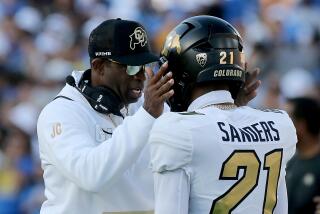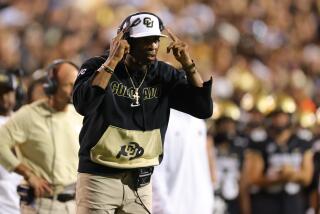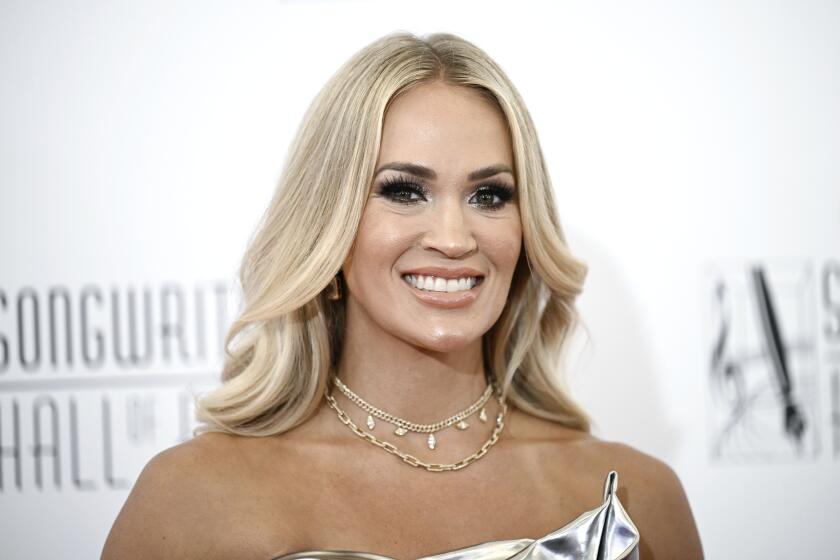‘The best tenor player in the world’: Pharoah Sanders at 80

- Share via
These days, the great tenor saxophonist and composer Pharoah Sanders shuffles when he walks, the result of a broken hip last year that’s on the mend. The free-jazz titan moved slowly across the dance floor on a recent weekday at the music venue Zebulon, his friend and longtime saxophone peer Azar Lawrence by his side as they headed toward the stage to play a set at the Frogtown club.
Onstage, drummer Tony Austin and keyboardist John Beasley were sound-checking, in the process scoring Sanders’ push toward the stage’s staircase with an improvised breakbeat.
The occasion was Sanders’ 80th birthday, which is Tuesday. The saxophonist dislikes the annual marker — “I don’t really get into that celebrating,” he’d say later. But he still plays his horn daily, so he jumped at the chance to get out of the house and create some music. The set they played, called “Another Trip Around the Sun,” will premiere on Tuesday as a livestream through Zebulon’s website.
As Sanders and Lawrence crept toward the stage, the onstage rhythm shifted. When it did, Sanders started grooving ever so slightly with the beat, in the process transforming his rickety walk into a kind of minimalist mambo. Lawrence began to strut too. Once onstage, Sanders playfully held his saxophone like an electric guitar, air-strumming and fretting as if he were his late bandmate Sonny Sharrock. A few of the dozen-odd attendees hooted with glee.
Best known for his transcendent work with John Coltrane in the mid-1960s and for an astounding eight-year solo run for Impulse Records starting in 1966, Sanders helped define the so-called spiritual jazz movement. Merging percussion-heavy free jazz with meditative ideas influenced by Eastern religion, chants and Sanders’ dynamic, smooth and occasionally skronky tone, his music on albums including “Karma,” “Tauhid” and “Black Unity” stormed psyches with a set of complex, structurally fluid instrumental ideas. Decades later, Sanders’ output continues to resonate with generations of creators, most notably the L.A. scene that birthed Flying Lotus, Kamasi Washington, Madlib, Carlos Niño and Terrace Martin.
“He’s probably the best tenor player in the world,” fellow horn player Ornette Coleman told the San Francisco Chronicle in 2006.

Unbeknownst to many, Sanders relocated to the Fox Hills neighborhood of southwest Los Angeles about 10 years ago, where he’s been living his winter years with his wife. During a sit-down at the venue a few days after the Zebulon set, the artist wore a disposable face mask while talking about the event.
“It’s like I’m living in ‘The Twilight Zone,’” the soft-spoken Sanders said of postpandemic life.
Massive concert rallies are out, but as election looms, Cardi B, Taylor Swift, Bad Bunny, Madonna and Billie Eilish urge their fans to vote for Joe Biden.
Known for his reticence to say much about his methods, his work or pretty much anything, Sanders spoke so quietly through his mask that he was hard to hear, especially from a socially distanced seat. What he did say arrived with typical brevity: “It is what it is,” he replied when discussing his pending birthday.
Beside him, fellow saxophonist Lawrence helped Sanders answer a question about one of the artist’s most famous works, 1969’s “The Creator Has a Master Plan.” Asked whether the current state of the world had caused him to question any claims of a grand design, Sanders was short: “The creator has a master plan. That’s it.”
Lawrence, who has known Sanders for decades, added: “The message that Pharoah has continued to give us is one of continued hope. The creator has a master plan — meaning that even during this period, all of this is within the master plan. Everything’s working together for our good.”
Sanders would go on to reply to a series of questions with single-sentence answers: “I used to do a lot of painting, but then I followed the music,” he said of his creative outlets, adding that his aim in composing and playing has remained consistent from the start: “Just let the music come, and spend as much time as you can listening.”
What does he listen to? “I listen to myself so that I know what I need to work on, and I let that be my guide.”

Across his life, Sanders has much preferred communicating with his horn, and during the birthday set he, Lawrence and the band — Beasley, Austin, Munyungo Jackson (percussion), Sekou Bunch (bass) and vocalist Tiffany Austin — converged to manifest their own master plan. After their four musical collaborators got situated onstage, Sanders and Lawrence stood back to back, posing for the camera as they focused on the music. Beasley rolled out an uptempo Fender Rhodes melody, followed by Austin’s skittering cymbal taps. Sanders’ and Lawrence’s horns then merged for a twin-toned saxophone melody from Sanders’ song “Tina” and the band took flight.
“He takes his time moving around, but when he gets onstage, man, he starts moving and grooving and dancing,” Jackson said of playing with Sanders. Jackson, who has backed Stevie Wonder, Aretha Franklin, Willie Hutch and Sting, described Sanders as a laid-back leader during the sessions. “He’s a very positive guy. He does what he does, we do what we do and we all play together. It’s like one big cloud growing, you know?”
“We’re endeavoring to heal through music,” Lawrence said. When he was first establishing himself in Los Angeles as part of pianist Horace Tapscott’s band, Lawrence used to see Sanders play at Hermosa Beach’s famed Lighthouse Cafe. “Pharoah reminded me a few weeks ago that I used to bring him white chocolate macadamia nuts when we’d visit,” recalled Lawrence with a laugh.
Both would regularly convene at the Aquarian Book Shop, the former hub of Black literary Los Angeles. These philosophical connections are evident on Lawrence’s 1975 solo debut for Prestige Records. Called “Bridge Into the New Age,” it was an attempt to convey what Lawrence calls “high vibrational music” as a way to positively influence culture.

Pharoah Sanders in 1968.
Forty-five years later, Lawrence is convinced that the current disease afflicting the world offers the opportunity for a kind of new birth. That sense inspired “New Sky,” which he, Sanders and band offered at Zebulon with a spirit of sublime optimism. “This is the starting point of the new era, the new energy,” Lawrence said. “Everything’s different. Everything is brand-new. There’s a whole new thing. Nothing is operating the same as it was before a pandemic.”
During the exuberant performance, bassist Bunch and percussionists Jackson and Tony Austin locked into a labyrinthine rhythm as Lawrence spun a melody on soprano saxophone. Sanders followed with a solo that moved with the fluidity of a running back in his prime, maneuvering in and out of traffic with effortless grace.
“As I’ve gotten older, I’ve tried to play in a way that’s easier for me,” Sanders said.
Just listen, he seemed to imply.
More to Read
The biggest entertainment stories
Get our big stories about Hollywood, film, television, music, arts, culture and more right in your inbox as soon as they publish.
You may occasionally receive promotional content from the Los Angeles Times.











